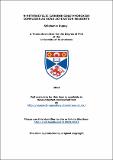N-heterocyclic carbene gold hydroxide complexes as bond activation reagents
Abstract
Although known since the 1930s, organogold chemistry has been dormant until recently, primarily due to preconceptions about the inertness of gold in transformations. However, this last decade has witnessed the emergence of a Golden Age with the development of a wealth of reports on gold in a plethora of reactions. In recent years, the drive for more atom- and step-economical and environmentally friendly reactions has become a field of intense research. In our on-going research on well-defined transition metal complexes bearing NHC ligands, our group recently discovered a new gold(I) hydroxide complex [Au(OH)(IPr)] (1a) that can be easily synthesised from the chloride precursor [AuCl(IPr)] (1b). A preliminary survey of the reactivity of this gold synthon has demonstrated interesting reactivity that holds great potential in bond activation reactions and the development of useful synthetic methods. Simplistically, this gold hydroxide complex can be seen as a strong Brønsted base. This thesis is dedicated to an in-depth examination of the reactivity of this complex in base-free bond activation reactions. Two themes predominate in the following chapters: the first part demonstrates the activity of gold(I) hydroxide as a bond activation agent to readily and efficiently access organogold complexes while the second part studies the reactivity of this compound in decarboxylation processes with carboxylic acids. Chapter 2 and 3 were dedicated to the development of new synthetic routes to access organogold complexes via base-free transmetalation reactions with organoborons and silanes using 1a. The combination of experimental and computational studies allowed identification and isolation of key intermediates in these reactions. Chapter 4 can be seen as a transition between the development of novel methodologies to synthesise aryl and heteroarylgold complexes and the first steps of gold hydroxide 1a as mediator in decarboxylation reaction. As a result, a novel mode of reactivity for gold was discovered and the synthetic route developed constitutes one of the greenest procedures to prepare organogold complexes with the generation of water and CO₂ as only side products. Chapter 5 and 6 venture further into the exploration of 1a in decarboxylation reactions and detail the development of a catalytic process for the protodecarboxylation reaction and subsequent mechanistic investigations of this reaction through stoichiometric experiments and kinetic and computational studies.
Type
Thesis, PhD Doctor of Philosophy
Collections
Items in the St Andrews Research Repository are protected by copyright, with all rights reserved, unless otherwise indicated.

